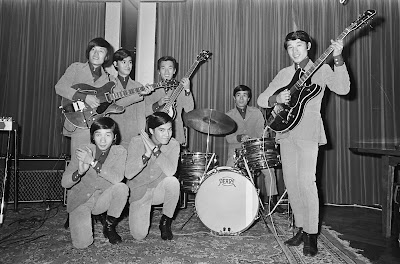Long time no Halloween, huh?
This week, it’s back to Japan!
Many of this week’s songs come from a bootleg compilation called “Sixties Japanese Garage-Psych Sampler” released in 1987. The sleeve is a bit racist, but the music isn’t.
The music that might be called “garage” or “psych” in this country, which is mostly Beatles/Stones/Yardbirds-influenced, in Japan was called “Group Sounds”. It draws upon many of the same influences, with the addition of Japanese pop. You’ll notice that the Group Sounds era lasts about as long as the Beatles, from roughly 1961-1971, with many of the bands breaking up after that.
This email will basically be just me copy/pasting the bits of info I can find on the web, because it’s hard to find out about these bands when I don’t speak the language.
The Spiders (ザ・スパイダース) were formed in 1961 by Shouchi Tanabe. The group split in 1970, with several of its members going on to have long careers in Japanese show business.
The Golden Cups (ザ・ゴールデン・カップス) formed in Yokohama in December 1966. The group covered a wide range of UK and US rock, blues and soul songs. They released ten singles and several albums before splitting up in 1971.
The Tempters (ザ・テンプターズ) was originally from Saitama. They released their debut single in October 1967 and enjoyed a number one hit the following year. Unusually for a GS band, most of their repertoire was written by member Yoshiharu Matsuzaki. They split up in 1971.
Takeshi Terauchi And The Bunnys (寺内タケシとバニーズ) was formed in 1966 after Takeshi “Terry” Terauchi split temporarily with his previous group, Blue Jeans. They were so named because Terry was born in the year of the Rabbit. They released their debut single in December of that year and had several hit singles and albums over the years that followed. However, musical differences emerged and Terauchi left the group, reforming Blue Jeans. The Bunnys continued without him for several years, finally splitting up in 1971.
The Mops (ザ・モップス) are one of Japan’s best known “group sounds” bands, particularly noted for their psychedelic period. The group was founded in 1966 by high school friends Mikiharu Suzuki (drums), Taro Miyuki (guitar), Masaru Hoshi (lead guitar) and Kaoru Murakami (bass), playing mostly instrumental rock ala the fabulously popular Ventures. Suzuki’s older brother Hiromitsu joined in later and became the group’s main vocalist, sharing the job with Hoshi. In the summer of 1967, their manager visited San Francisco and was very excited about the hippie movement that was booming there. He brought a copy of a Jefferson Airplane album back with him to Japan, which he impressed the Mops with. The band became enthusiastic about the new sounds, and singer Hiromitsu Suzuki especially became a big fan of Animals singer Eric Burdon. In what seems a fairly commercially driven decision, the Mops, prodded by their manager, became a “psychedelic band”, and signed with JVC Records.
The Nikkatsu Corporation (日活株式会社 Nikkatsu Kabushiki-Kaisha) is Japan’s oldest movie studio. In 1970 they released Alleycat Rock: Female Boss aka Stray Cat Rock: Delinquent Girl Boss. This was the first of the “Stray Cat Rock” (or “Alleycat Rock”) series of girl biker gang movies, designed to compete with the Delinquent Boss series from rival studio Toei. There were four sequels, Stray Cat Rock: Wild Jumbo, Stray Cat Rock: Sex Hunter, Stray Cat Rock: Machine Animal and Alleycat Rock: Crazy Riders '71.
Melody of Rebellion (Hangyaku No Melody 反逆のメロディー) is another Nikkatsu film, but I don’t know much about it except what I read at that link.
Stray Cat Rock: Machine Animal, the fourth film in the series, features music from a band called Peter Pan. (It was at first difficult to determine whether Peter Pan was a band or a person, but here is a clip showing the band:
Outcast was formed in spring 1966. They released six singles and an album on Teichiku before splitting up. (It’s very hard to google a band with a name like that.)
GarageHangover.com has a page about the Beavers, including multiple different conflicting versions of their bio. I’m not gonna sort through them, you can check them out here.
Except for the detail that two of their members were Nobuyuki Takahashi and Shigeru Narumo, I couldn’t find anything about The Fingers. Once again, that’s a hard name to google.
That’s it for this week! Maybe next week I’ll do a show that’s somehow easier to put together, but at this rate I doubt it.
Leave a comment in the usual places!
Enjoy!
- Rev. Dr. Dr. Phill
フリフリ - 「涙くんさよなら」 (Furifuri - "Tears of Goodbye") - ザ・スパイダース (The Spiders) (1966)
銀色のグラス (Love Is My Life) - ザ・ゴールデン・カップス (The Golden Cups) (1968)
テル・ミー・モア (Tell Me More) - ザ・テンプターズ (The Tempters) (1969)
バーニングバーニング (Burning Burning) - 寺内タケシとバニーズ (Takeshi Terauchi And The Bunnys) (1966)
御意見無用 (Iljanaika) - ザ・モップス (The Mops) (1971)
アイ・アム・ジャスト・ア・モップス (I'm Just a Mops) - ザ・モップス (The Mops) (1968)
反逆のメロディー M-10 (Melody of rebellion) - 玉木宏樹 (Hiroki Tamaki) (1970)
マシン・アニマル Ps7a-1 (Machine · Animal) - ピーターパン (Peter Pan) (1970)
のっぽのサリ (Long Tall Sally) - アウト・キャスト (Outcast) (1967)
なればいい (Anything You Want) - ザ・スパイダース (The Spiders) (1967)
ホワイ・ベイビー・ホワイ (Why Baby Why) - ザ・ビーバーズ (Beavers) (1968)
ホワイト・ラビット (White Rabbit) - ザ・モップス (The Mops) (1968)
メラ・メラ - 「ザ・スパイダースの大進撃」 (Mela Mella - "The Spider's Big Advance") - ザ・スパイダース (The Spiders) (1968)
セックスハンター Bgm (Sex Hunter Bgm) - 鏑木創 (Hajime Kaburagi) (1970)
グロリア (Gloria) - ザ・フィンガーズ (The Fingers) (1968)

























No comments:
Post a Comment